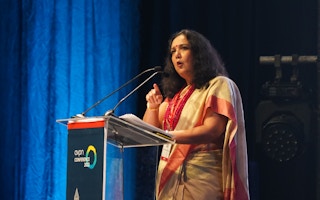Asian philanthropists need to “step up” and challenge the dominant Western approach to impact investing in a region faced with severe post-pandemic funding gaps, the head of Asia’s biggest network of social investors said.
To continue reading, subscribe to Eco‑Business.
There's something for everyone. We offer a range of subscription plans.
- Access our stories and receive our Insights Weekly newsletter with the free EB Member plan.
- Unlock unlimited access to our content and archive with EB Circle.
- Publish your content with EB Premium.
Speaking at the AVPN Global Conference in Bali on Tuesday, Naina Batra, chief executive of Asian Venture Philanthropy Network (AVPN), said that the Western approach to philanthrophy does not always work in Asia, and solutions to social and environmental problems need to come from more homegrown social investors.
Environmental, social and governance (ESG) investing has soared in the years since the Covid-19 outbreak, with East and Southeast Asia among the fastest growing regions for such investments.
However, Western philanthropic organisations are prone to misallocating capital, because they lack local knowledge in how best to spend donor money, Batra said at the event, themed “the Asian decade”.
“A lot of funds originated in the West come looking for Asian investors. But they don’t really understand how to deploy that capital in Asia. How are they really going to get to the most vulnerable communities where is it really needed?” she said.
The funding gap for achieving the Sustainable Development Goals — 2030 sustainability targets set by the United Nations — has doubled since the pandemic started, to US$4.2 trillion a year, and it is time for Asian funders to “take the stage” to fill this gulf in capital, Batra said.
“We have to rethink how impact capital is accumulated and deployed in Asia. The power dynamic has to shift to those on the frontline,” she said. “We need to develop our own solutions and we need to highlight our own community leaders.”
“We cannot fly under the radar anymore. If we do that, we will get models pushed on us that are very Western in their approach,” Batra told Eco-Business on the sidelines of the event.
Take risks, don’t expect returns
Asia’s business empires are increasingly looking to allocate capital to good causes, as a younger generation inherits control of the family fortune. Asian wealth holders have an opportunity to address ESG issues such as rising inequality that governments have struggled to control, Batra said.
“We’ve seen inequality grow in Asia, and governments have not been able to keep up. They need the private sector,” she said.
Batra called on Asian philanthropists to be bolder in their approach to investing in good causes.
“Philanthropists in their business lives take risks — that’s how they’ve made money. But when it comes to giving their money away, they’re too risk averse,” she said. “You’re giving it away. Take a risk. Back an innovative solution.”
Traditionally, Asian businesses have been wary of supporting social issues that are considered the role of governments to solve, and tend to avoid “thorny” topics that are intertwined with government interests. But this does signal a lack of appetite for philanthropy in Asia, Batra said.
“Asian philanthropists support gender equality, but they don’t necessarily call themselves feminists. We support activism, but don’t use the word ‘activist’ — you have to understand the cultural context,” she said.
Asian countries always rank highly for charitable donations, with Indonesia topping the 2021 World Giving Index (WGI), she noted.
Batra cautioned against philanthropic funders always expecting a return from their investments.
“Right now there’s no philanthropic industry in Asia like there is in the West — and I use the word ‘industry’ very intentionally,” she said.
“If we keep accentuating market returns, we are going to constantly put pressure on the business to focus on financial return, moving away from the impact intentionality that is so important,” she said.
On Tuesday, AVPN launched a US$3 million sustainability seed fund, with backing from Google.org, the charitable arm of search giant Google, and Asian Development Bank, to help Asian non-profits combat climate change through technology.
AVPN said that it hoped the seed fund would “open a floodgate of urgently needed financing” to fight climate change. More than 57 million people in Asia were severely affected by climate-related disasters last year.








